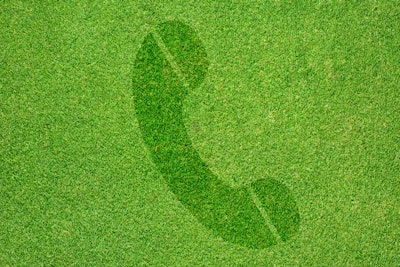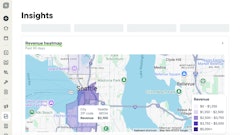
The phone is the backbone of business operations for lawncare professionals and landscapers. Whether conducting property evaluations, responding to emergency service needs or attending initial client consultations, lawncare and landscaping business owners rely on effective communication while on the go. When calls to or from clients go to voicemail, lawn business owners miss out on opportunities to increase their revenue and customer base.
With scam texts and calls on the rise, small business owners are grappling with a multi-pronged issue. Answering scams can drain valuable time from legitimate business operations. Ignoring legitimate calls that appear to be scams can jeopardize a brand's reputation. Responding to referrals when outreach is labeled a scam can result in lost leads. How can lawncare professionals and landscapers avoid these threats while ensuring calls that matter don’t go unanswered?
Why Answering Calls Matters
A recent report showed that 63 percent of small businesses credit word of mouth for generating new customers. Growing the customer base is critical to business success for lawn care and landscaping. Business owners committed to improving their bottom lines must promptly respond to each legitimate call or risk losing business to a more responsive competitor.
Even in a digital age, phone calls remain the preferred way customers handle important service decisions. Research shows 76 percent of consumers still choose to call over using forms or online chats, especially for urgent needs. When calls go unanswered, the impact is immediate: 32 percent of consumers will leave a brand after one poor experience and 73 percent after two. Every missed call is a missed opportunity in industries where trust and timing are critical. Ignoring unknown numbers may feel like protection from scams, but it will result in losing real leads to more responsive competitors.
Scammers are professional social engineers, preying on populations going through times of uncertainty and fear. For green industry pros, scammers target peak seasonal times, knowing that business owners will answer any call, hoping it's a prospective new job. For those short on leads, it will cause desperation and be detrimental to opening the door to scammers preying on vulnerabilities.
Along with these psychological antics, there is the rampant weaponization of technology to evolve scam strategies to target small businesses constantly. When the company's phone number is compromised, potential customers will be contacted by scammers impersonating the business, presenting phone job services and prepaid discount scams. Personal information is far and wide online; for businesses, this is a non-negotiable way to gain visibility and achieve business growth. For scammers, public-facing information is all they need to weaponize scam tactics to steal sensitive personal data or financial information.
In fact, according to a 2025 FTC report, text-based scams are on the rise, with Americans losing around $470 million to text scams in 2024 alone. These fraudulent activities can disrupt a small business’s operations, damage a brand reputation, lose customer trust and make it more challenging to achieve business growth in an already tough economic climate.
More about customer relationships on GreenIndustryPros.comTailoring Customer Communication Based on Generation - Customer service experts explain how landscape companies can cater their communications to each generation of customer. Trust Matters: Five Ways to Create Lasting Relationships - Building quality customer relationships includes prioritizing the relationship with your customer over the sale. 8 Ways to Find your First Customer - Here are some smart strategies you can use to identify and attract those critical first customers |
Strategic Communication Practices Enhance Trust
Maintaining customer trust starts with securing how you communicate. With scam calls on the rise and legitimate numbers increasingly marked as “Scam Likely,” it's critical to protect the phone line and the business reputation. The following strategies provide a useful framework to help lawn care professionals stay connected with clients and minimize the opportunities for bad actors to get in the way of leads:
- Take Advantage of Branded Calling for Caller Verification: Branded calling helps ensure the business name and logo are visible when reaching out to clients, improving the chances they’ll answer. Branded calling gives customers confidence at the first point of contact and protects the company number from being mistaken or misused as a scam. One report showed that 73 percent of people were more likely to answer calls that displayed the company name and logo; they are more likely to engage with a known and trusted source for communication.
- Utilize AI-Driven Scam Filtering Tools: Artificial intelligence (AI) and machine learning (ML) are now the norm in business operations. To evolve and meet the challenges posed by bad actors, choosing a tool that utilizes AI-powered scam detection services that filter out real-time fraudulent calls and messages is paramount. These tools analyze calling patterns and reported data to block known scams before they reach business owners. This automated layer of protection works in the background to keep communication lines open and secure, especially useful for lawn care professionals on the go.
- Deploy Advanced Phone Systems: Lawn care professionals will benefit from phone systems that route calls based on patterns like time of day, caller history or ID status. Following this process allows known customers to be connected promptly while unverified callers are guided through basic screening, helping to pick out potential scams.
- Use Specialized Answering Services: Answering services familiar with the lawn care and home service industries provide around-the-clock coverage, with industry professionals who can assist with call handling and scheduling support. This approach ensures legitimate client calls are promptly answered and prioritized, even outside business hours.
- Take a Proactive Communication Approach: Instead of waiting for inbound calls, lawn care professionals can proactively confirm appointments, follow up through multiple channels, and communicate availability and contact preferences. This approach helps set expectations, reduce confusion and strengthen client relationships by ensuring clients understand the appropriate channels to contact businesses.
By combining these strategies, lawn care and landscaping professionals can ensure operations stay focused on the important calls while protecting phone numbers from fraud.
Scam texts and calls have become an uncomfortable norm in a digital world. Scammers are social engineers, and small businesses face environmental uncertainties that scammers take advantage of. However, by staying proactive and utilizing technology such as AI-based filtering tools and branded calling, lawn care professionals can significantly reduce the risk of falling victim to fraud.
Protecting a phone number is not just about avoiding nuisance calls; it's about securing the business’s future and ensuring successful leads. It is imperative not to wait for a scammer to ruin the chance of the next big client; taking action today will safeguard tomorrow’s threats.



















